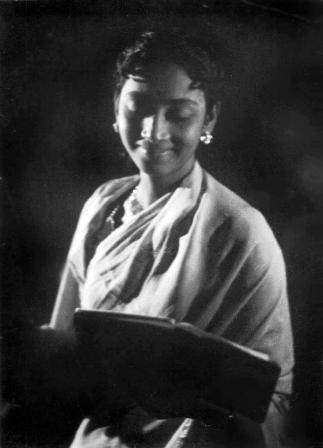
We present an extremely rare song from the film Chaar Minaar (1956) ripped from the 78 rpm disc N51801 by our dear friend Sounak Gupta.
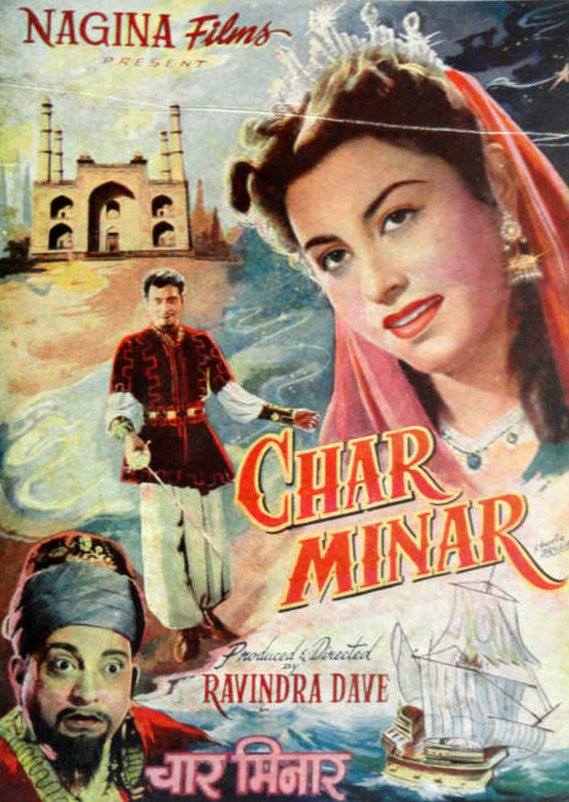
Lyricist – Vishwamitra Adil, Music Director – Sardul Kwatra

We present an extremely rare song from the film Chaar Minaar (1956) ripped from the 78 rpm disc N51801 by our dear friend Sounak Gupta.

Lyricist – Vishwamitra Adil, Music Director – Sardul Kwatra
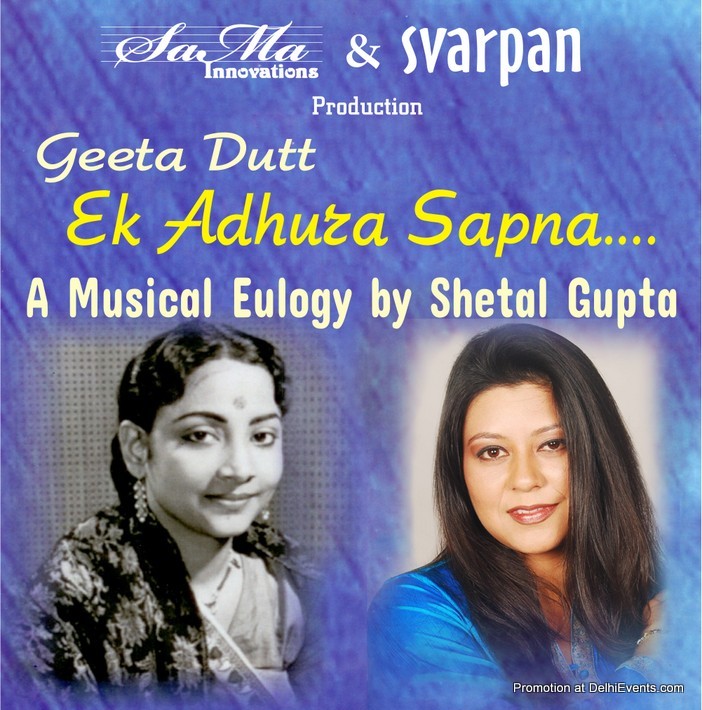
Sa Ma Innovations & Svarpan present ‘Geeta Dutt : Ek Adhura Sapna…’ a musical Eulogy by Sheetal Gupta on 28th July.
Time : 7:00 pm
Entry : by Invitation cards
For Invitation Cards and Enquiries – 9212161435, pnpro.sv@gmail.com
Place : Kamani Auditorium, Copernicus Marg, Mandi House, New Delhi-110001
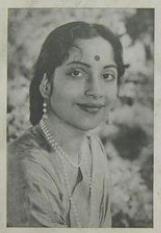
Geeta Dutt is a singer I never thought about as I was growing up. My familiarity with her was fairly limited – I was most familiar with her work for her husband’s films and to my childish mind, I had her firmly pegged her into “rota-dhota” slot with songs like “Na jaao saiyyan “, “Waqt ne kiya kya haseen Sitam”, “Koi door se aawaaz de”, “Preetam aan milo”, and even “Aaj sajan mohe ang laga lo” as “proofs”! Of course, I was also aware of her other popular numbers like “Babuji dheere chalna”, “Hum aapki aankhon mein”, “Piya aiso jiya mein”, “Jaane kahan mera” but for some reason, her sadness is what stayed with me far more. Even the night club singer image did not penetrate my “impressions” till much later.
It was much later that I actually had the chance to listen to her wide range of songs and realized the vast variety in her repertoire – frankly a journey of discovery and wonder that still continues. A few things have stood out for me from time to time about her singing. For one, her voice has a curious innocence to it, no matter what she sings, even the so called night club songs, she seems to have an undertone of innocence. Sometimes it is just like a young girl dressing up in mommy’s clothes to appear too grown up and it is just as endearing. Even when she injects oomph into a number, it never appears overdone and I credit this undertone of innocence for the same.
The second striking quality to her singing is the inherent emotion that comes across so loud and clear. And in that respect, her range is endless. Whether its raw grief of a separated lover, wild exuberance of youth, unrestrained joy of a woman in love, a mother’s adoration for her child, hesitant exploration of a taboo emotion, wistfulness or yearning, whimsical self-exploration, selfless devotion, or even the unabashed titillation – she consistently delivers the right emotion with the appropriate amplitude as per the demand of the song. Today, it is this aspect of her singing that I would like to explore a bit with examples from some of my favorite Geeta Dutt Solos. I was asked to stay in the realm of Non-Guru Dutt movies so that is what I have tried to do for the most part. Also, I have never seen the picturization of some of these songs so my comments are purely based on what I hear in the lyrics and singer’s expression.
Finally, and this one is purely personal to me and somewhat related to the last one, a good reason why her songs resonate with me is that for many of her songs, it seems to me that she is singing about her own life and her own circumstances. The singing is straight from the heart and the mood and tone of songs match what I imagine the joys, sorrows and travails of her life would have been at different points. She is a woman who experienced a lot in life and I think her experiences reflect in her singing and serve to heighten the emotional content – appeals to people like me who shoot straight from the gut…
Now, without any more ado, let us delve into many moods of Geeta Dutt…
1. Sad –
To me, Geeta Dutt was a total queen of sad and unbearably tragic songs. The impression sure has a lot to do with the early exposure but the number I have chosen today is a song with a relatively unknown composer for an unreleased film and it is my absolute favorite song of this composer. Yes, its Daan Singh’s composition for unreleased film “Bhool Na Jaana”. Hearing this song is pure heartbreak. The pathos in her rendition is unbearable, one can almost imagine it being filmed on a dying woman whose only desire is to be held by her separated lover/mate for one last time, but this is likely a woman who realizes that this wish will probably remain unfulfilled. Dr. Hariram Acharya’s words simply come to life and when she mouths
ये तेरा मिलन ये तेरा क़रम, है मुझे हयात से कम नहीं
तू है सामने तो मेरे सनम, मुझे मौत का भी अलम नहीं
You so totally believe her …
The second song in this category is from Detective, a 1958 release, penned by Shailendra and composed by her brother Mukul Roy. This is a song that falls in the third category for me – it always seems that GD is pouring her own heart out and recounting her own life. She simply seems to live it and you hear it clearly. As she mouths the words, one can map them to what one imagines her life must have been
दो चमकती आँखों में कल ख़्वाब सुनहरा था जितना
हाय, ज़िंदगी तेरी राहों में आज अँधेरा है उतना
हम ने सोचा था जीवन में फूल, चाँद और तारे हैं
क्या ख़बर थी साथ में इनके काँटे और अंगारे हैं
हम पे क़िस्मत हँस रही है कल हँसे थे हम जितना
इतने आँसू इतनी आहें दिल के दामन पे लेकर
जाने कब तक चलना होगा सूनी सूनी राहों पर
ऐ मुक़द्दर ये तो बता दे मुझको सहना है कितना
2. Happy and Carefree
My absolute favorite Geeta song in this genre is the Mr.&Mrs. 55’s lovely solo “Thandi Hawa, kali ghata aa hi gayi jhoom ke” but the song I have chosen for this article is technically a duet with Asha Bhonsle but is practically a solo as Asha only hums a little. It’s the forever fresh, buoyant, pristine song from Sujata that takes one back to those “Bachpan ke Din” in a jiffy. And Geeta Dutt sounds so angelic, almost celestial under S.D. Burman’s baton for “Sujata” with the childlike innocence coming across so clearly.
3. Sweet and Romantic
I have two songs for this category. My first pick is “Tan man mera tarse” from 1952 movie Paataal Bhairavi. I really like this song mostly for the rendition. GD’s voice rings out crisp, clean and pristine. It has none of the full throatedness or oomph. Here again she worked with a gentleman who does not have a vast repertoire in HFM as MD but this song with Geeta Dutt is simply breathtaking. Ghantshala is the MD and Pt. Indra is the lyricist.
The second one is a more typical representative of GD’s romantic solos – playful, bubbly, quixotic and utterly enchanting. “De Daalaa, Dil De Daalaa” from Musafirkhaana penned by Majrooh and composed by OPN fits right in that mould.
4. Devotional
Now GD has a wide range of work in this genre – a lot of her work in the 40s was for mythological films and those gave her ample scope for devotionals. The crown jewel for her in this respect is the soundtrack of Jogan . Here it is a toss-up between “Ghoonghat ke pat khol” and “Ae ri main to prem diwani…” and the later is my pick today – simply because it’s a more versatile bhajan that can be taken in non-Godly context also and simply describes a woman’s yearning perfectly. While the singer can claim no credit for the words, that belongs to another remarkable lady, her rendition does make this bhajan memorable. And though I have heard various versions of this bhajan, this rendition remains my favorite and is inevitably the first to come to mind. Again, GD’s voice rings out pure and clear but with an undefinable extra element – not exactly pain but something akin to it that makes its sound like a song of yearning but with a calmness to it that keeps it firmly in the devotional range. Bulo C. Rani is the MD here with poetry credited to Meera Bai.
5. Comic or ridiculous
I think some of the best work Geeta Dutt has done in this genre is reflected in her duets – those with G.M. Durrani and perhaps S.D. Batish are prime examples of it – that is where her sense of comic timing and extreme playfulness comes into play. But today, we will restrict ourselves to solos, so in this category, my pick is this delightful song from “Darogaji” that is outwardly a simple fun song but is actually also a political comment on corruption in public service (but that is the lyricist’s credit and is material for another discussion, another day ☺ ). This one is penned by Manohar Lal Khanna and composed by Bulo C. Rani
6. Motherly Love
While GD has a few loris to her credit, the one that comes to mind first is always the Sujata song. In fact, talk of loris in general in HFM and this one is bound to figure amongst the top few. Here you hear none of the exaggerated oomph which Geeta Dutt is often associated with – you simply hear a mother’s love for her child flow and the rendition is suitable toned and aptly “innocent”. Again this one has Geeta singing Majrooh Sahib’s words under S.D. Burman’s baton.
7. Wistful or yearning
Here is a genre that GD simply ruled, imho, just by virtue of her voice quality, especially in the later years of her career. Every time I listen to songs like “Meri jaan, Mujhe jaan na kaho…” or “Koi chupke se aake”, or even “Koi door se aawaaz de chale aao…”, the primary emotion that I hear is that of dreamy, wishful yearning though the underlying flavor varies a little in each case from reflective to melancholy. My pick for this genre today is “Aaj Ki kali ghata, mast matwaali ghata…” from Uski Kahani – interestingly, majority of the songs that came to mind today are tuned by Kanu Roy so may be it’s the MD’s magic also that is responsible for bringing out this facet of GD’s singing. Now I have no clue as to what is the story of this movie, how the character fits in and what is the situation of this song but as I listen to her mouth the lyrics penned by Kaifi Azmi (which are excellent in their own rights and certainly are my clues to the rest of the rambling ☺ ), I get a strong feeling that this is a character on the brink of admitting / acknowledging or responding to feelings that are somehow taboo. Now can’t say in what way – may be this is a bored/abused wife on the brink of infidelity, or maybe she is a widow for whom this admittance is prohibited (yeah, I am, prone to being fanciful) or may be there is a third very different cause but the uncanny feeling I get is that this song is about a love pleasurable yet forbidden in some way. As the mukhda starts, and one hears
आज की काली घटा, मस्त-मतवाली घटा
मुझसे कहती है कि प्यासा है कोई
कौन प्यासा है, मुझे क्या मालूम
We know right away, this one is about a newly-blossoming or just budding relationship as opposed to an established one and note the slight hesitation in “Kaun pyaasa hai” and “mujhe kya maloom” – as if maaloom to hai par kah nahin sakti (and its she herself too). The antara of course, is what first brings in the feeling that this is a relationship that has some contentions and lyrics play a major role but her intonation also brings out the struggle – hear the “Kyun samaayaa hai koi” and note the stress on “kyun” and it is clear that while the feelings are there, she is not comfortable at all with them
प्यास के नाम से जी डरता है
किसी इल्ज़ाम से जी डरता है
शौक़-ए-बदनाम से जी डरता है
नीची नज़रों में समाया है कोई
क्यों समाया है, मुझे क्या मालूम
Moving on to the next antara, the forbidden fruit feeling just gets stronger – falling in love is like “ladkhadaana” and may be her non-responsiveness is the “bevajah shikaayat”, may be not. Aur koi dil kii dahleez tak hii aayaa hai, dil mein nahin – again lyrics and delivery are so in sync, she seems to feel what she is singing.
प्यासी आँखों में मुहब्बत लेके
लड़खड़ा जाने की दावत लेके
मुझसे बेवजह शिकायत लेके
दिल की दहलीज़ तक आया है कोई
कौन आया है, मुझे क्या मालूम
Now this next one is where the tone changes – both in lyrics and a little in the rendition also – there is a hesitant admission that this is pleasurable (clearer in lyrics) emotion but there is an underlying wistfulness (much more in the rendition) also as if she wishes this was more acceptable or that she was free to admit her feelings openly – that there was no fear ki koi afsaanaa na ban jaaye – and that tone gets stronger in the in antara after too.
कुछ मज़ा आने लगा जीने में
जाग उठा दर्द कोई सीने में
मेरे एहसास के आइने में
इक साया नज़र आता है कोई
किसका साया है, मुझे क्या मालूम
ज़िन्दगी पहले ना थी इतनी हसीन
और अगर थी तो मुझे याद नहीं
यही अफ़साना ना बन जाये कहीं
कुछ निगाहों से सुनाता है कोई
क्या सुनाता है, मुझे क्या मालूम
Now of course, all of the above is what I hear and is pure speculation – the actual use of the song may be really very different but the song is a pleasure to hear and a lot of it is on account of the singing.
8. Whimsical
This is a strange category and not too many songs would be generally placed in this one. My prime example is the Anubhav song, penned by Gulzar and once again tuned by Kanu Roy. This is a song that has minimal orchestration and GD simply carries it on the strength of her voice. It is a song of a woman’s self-exploration, a song of what if’s – so wonder and reflection underlined with both a mild regret and a strong sense of relief and GD’s rendition reflects all these feelings appropriately at the apt time. I’ll leave a detailed stepping through for another day…
9. “Night Club” songs
This is supposedly the genre that Geeta Dutt is most identified with. To my mind this one is remarkable on account of her amazing ability to infuse these so called Club songs with a plethora of different emotions. On the surface, they all are the seductive, come hither ones but some of them just surprise you with an undertone or overtone that seems to indicate something different. Also noticeable is that innocence, that first quality of her voice in some of them. Some sure have an exaggerated oomph to them but most are very tastefully executed (and I mean singing – no comments on any picturization – haven’t seen many nor do I really want to in some cases). I will go into what I call special cases in this category and will largely ignore the majority of regular club songs.
First set of songs in this category are ones that I believe are likely filmed on a second lead, perhaps of dubious character but sure a woman who is in love with the man she is singing for – these don’t seem to be undirected at all. A prime example, imho, is “Mujhe huzoor tumase pyar hai…” from Son of India, composed by Naushad and penned by Shakeel Badayuni.
The full audio (including the stanzas from the film soundtrack and the 78 rpm record) is available here
The second category is that of songs that pack a philosophical / meaningful punch under the guise of being a club song – two examples here – note the seemingly gay abandon along with the tone of challenge in the first and pay attention to the slight undertone of regret – It is a Madan Mohan – Rajendra Krishan combo from Pocketmaar and makes me wish that the lady had heard herself and taken her own advice – we would have likely had much more music from her to enjoy.
Next one is another Madan Mohan – Rajendra Krishan combo, this time from Chandan. Again a song that is overtly an invitation but hides some philosophy (on part of lyricist) and perhaps regret and fear masked as carefree abandon (on part of the singer)
Final subcategory in this category are songs that are songs that are curiously innocent despite there come hither lyrics – are not really club songs but have the flavor of them too. Here my pick is this lovely Milap (1955) number which I had never seen till a few months ago though I had heard it innumerable times and pretty much “knew” it. I did not know that it was picturized on Geeta Bali but if I had to guess, she would have been my first guess. I also did not know where it was picturized – for all its overt sensuousness, it had undertones of innocence and naughtiness that made it unsuitable for a club like setting, the overtones and the lyrics certainly carried a suggestiveness (note the chutkis for effect :-)) that ruled out a simple picnic or song sung by a traditional “heroine” of the movie. The song strongly suggested that the character lip-synching this must have some shades of gray, can’t be a ‘holier than thou’ leading lady, nor should be an outright vamp (though that is more possible as this lady is out to seduce). My guess prior to watching the song was a kind-hearted gangster’s moll is likely, possibly trying to entrap an unsuspecting or even disguised hero. A later viewing confirmed its partial correctness. This time yrics are by Sahir and MD is N. Dutta
Acknowledgements:
We are grateful to our dear friend Archana Gupta for this wonderful tribute to Geeta ji on her death anniversary today.
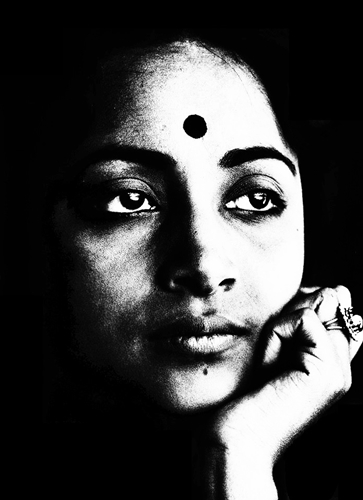
“Geetadi had come to Calcutta for three or four days to attend a few musical programmes arranged by my close friend, Barin Dhar (this was around the mid sixties, after the demise of Guru Dutt). Hearing the news of her coming, I went to the hotel where she had lodged along with music composer Rotu Mukherjee with a request that she should record songs in Rotu’s composition that year. Geetadi agreed as soon as we placed our request. She was very happy with the proposal and with a lot of enthusiasm she rehearsed her new song, “Aha Swapna Swapna Sobkichhu Aaj Lagchhe”, which was penned by me and tuned by Rotu.
From the hotel itself, I gave a call to the office of HMV to inform that Geeta Dutt had agreed to record Bengali songs for Basic Disc this year. Informing that she would be here for another two or three days, I asked the official for a date. The business institution HMV, without wasting a second answered, “We are not interested in recording Bengali songs of Geeta Dutt.”
We were not given a recording date and I had to lie to Geetadi, telling that in the coming fifteen days, there was not a single slot free for recording at the HMV studio. I and Rotu left Geetadi’s room”, thus recalls eminent lyricist Pulak Banerjee.
Around fifteen years later, a Basic Disc of Haimanti Shukla (released in Pooja, 1979) contained four songs, three tuned by Manna Dey and the fourth, by Rotu Mukherjee. The fourth song was, “Aha Swapna Swapna Sobkichhu Aaj Lagchhe” – yes, the song Geeta Dutt was supposed to record in the mid sixties, the song, an artiste of her stature (who during a period may have even cancelled projects directed towards her, due to lack of time – considering her then busy schedule) had enthusiastically learnt from her junior composer, eagerly willing to record!
AHA SWAPNA SWAPNA SOBKICHHU AAJ LAGCHHE,
AMAR SONGI HOYE CHANDRAKALA JAGCHHE.
Today, I feel as if everything is a dream and just the crescent moon is spending this sleepless night with me, as a close companion…
EKI BAUL BAUL BATAS BOKUL-GONDHE ,
KAR EKTARATI BANDHLO BYAKUL CHHONDE.
Allured by the sweet smell of the Bakul (Maulsari) flower, the wind seems to have tuned its Monochord, and is moving around, like a Minstrel…
TAR MISHTI MISHTI GAANER DOLA LAGCHHE,
AMAR SONGI HOYE CHANDRAKALA JAGCHHE.
I can feel the swing (rhythm) of its sweet song, with just the crescent moon as my companion in this sleepless night…
JENO AMAR ONEK DINER ICHHE GO,
CHOKHER KONE AAJKE DHORA DICHHE GO.
My long-unfulfilled wishes now seem to have got an opportunity to take shape and are appearing before my eyes…
EKI NATUN NATUN MONER KOTHAR GOLPE,
TAR EKTI ASHA METE NA AAR ALPE.
But in the crowd of the new dreams that are arising in my mind, my expectations (for fulfilling them) seem to rise and rise…
MON BHABTE BHABTE KATO CHHOBI ANKCHHE,
AMAR SONGI HOYE CHANDRAKALA JAGCHHE.
In this phase, in its dreams, my mind goes on painting so many pictures, with just the crescent moon accompanying, in this sleepless night…
RELEASE : POOJA, 1979
RECORD NUMBER : S/7EPE 3268
SONG : AHA SWAPNA SWAPNA SOBKICHHU AAJ LAGCHHE
LYRICIST : PULAK BANERJEE
MUSIC COMPOSER : ROTU MUKHERJEE
ARTISTE : HAIMANTI SHUKLA
Please click on the triangle next to the song name below to listen to the song
Haimanti Shukla : AHA SWAPNA SWAPNA SOBKICHHU AAJ LAGCHHE : Non-film, MD – ROTU MUKHERJEE, Lyrics – PULAK BANERJEE
Whosoever may have finally been selected to record this song, I hear this song only in Geeta Dutt’s voice! This song just can’t be anyone else’s. Just hear Haimanti’s rendition. She is an excellent artiste; no doubt and she has her own style of singing. But in this song, who knows why, in my ears she still sounds like Geeta Dutt. Friends, please hear and judge, I do not intend to force anyone to believe what I feel – rather, why should I? I feel some divine connection with my beloved Geetaji when I hear this song (so what if it has actually been recorded by someone else) and keep hearing again and again, often with tears flowing down my cheeks.
Just consider the time when this song was first presented before Geeta Dutt – say, 1965-66 (yes, I am sure it was one of these two years, the reason – let that remain untold right now, I am afraid, some associated naming can hurt other’s feelings. Just keep in mind that Geetaji was once again ‘allowed’ to record Bengali songs in 1967) and the condition of her mind then. A shattered person in every respect, having lost her love, almost lost her career, deprived of basic needs of life – have read from authentic sources that she was even deprived of her own wealth, not even the basic amounts, with which she could live a life up to some standards with her children, and one, who had just come out of a severe nervous breakdown. An artiste she is, whatsoever be the circumstances, how could she have survived without her Art (not to forget, she had recorded her ever-famous song, “Aaj Ki Kaali Ghata” in 1966, when she is already in a financial crisis, free of any payments, as Kaifi Azmi had once recalled – that proves how great an artiste she was – not the money, but the pleasure of being associated with her Art was what, mattered for the inner soul of Geeta)? Geeta Dutt was then gradually trying to come back to her career, singing in public functions now and then, wanting to explore, whatever little may have been remaining for her, in her life.
My attempt at translating the song may have been far from perfection, but whatever little it is, friends, try to follow the lines, each time remembering Geeta Dutt’s condition then. At the verge of those shattering days of her life, when she is trying to put herself and her career back to shape, wasn’t her recent past (the past two or three years of her life from then) seeming just like a dream? Isn’t she still spending sleepless nights, thinking how she should proceed so that she can raise her children to her satisfaction? Hasn’t the sweet wind, so long seeming to have stopped blowing, just begun to sing it’s tunes in her ears, blowing gently, rejoicing her plans for a comeback? Isn’t she losing track, while keeping in mind all her dreams, all expectations from her own self, as she steps back to the battlefield of life, in which, she has accumulated wishes to win?
Who knows, with all these thoughts in mind, perhaps tears had been flowing down Geetaji’s cheeks as she was read out and made to rehearse “Aha Swapna Swapna Sobkichhu Aaj Lagchhe” – maybe her soul was finding company in the song, she was finding her own self amidst the song! At the verge of all this, the song, which by then had been fully rehearsed, was ‘snatched away’ from her. To me, it seems like a great distance being created between one and her closest associate – a close friend, a soul’s mate. Whenever I think of this song and the incident associated with it, I seem to visualize Geetaji, at first all alone… Then rejoicing a close friend’s arrival as she learns the song and seemingly finds her own self in it… And finally, the given gift (the suddenly-arrived close friend – the song) snatched away from her (HMV refusing to record her Bengali songs) and Geetaji going back to her initial phase of loneliness, of desperation… Do not know if I would have felt the same if it had been some other sort of song. This very feeling makes me too emotional while I hear this song… I find Geeta Dutt in it… Whosoever might have finally recorded it, for me, “Aha Swapna Swapna Sobkichhu Aaj Lagchhe” remains Geeta Dutt’s and will ever remain hers!
Today, that she is no more with us, it is perhaps useless to think in this way. Whatsoever may have happened, I have nothing to do today. But just as years pass by, we complete spending thirty nine-forty-forty one years without Geeta Dutt, yet rejoicing her melodies, deriving our pleasure and joy in life, from her dulcet renderings, I find myself guilty today. Do not know who else would share the same feeling… The very person, through whose melodies we find our happiness in life even after four decades of her demise – in those sleepless nights, had just wanted to dream of a bright day ahead – in the silence of the night, had just wanted the crescent moon as a companion – and we deprived her of even that?
Acknowledgements:
We are grateful to our dear friend Sounak Gupta for this excellent research based article as a tribute to Geeta ji.
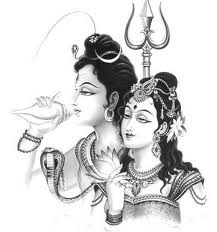
Pujite maheshe heri prano-dhone,
shibo-sheere dite bari bari bohe du-nayane…
Tripurari kori dhyan,
hride jaage se bayan,
akulo pagal pran,
rakhite nari jatane…
Katore karuna karo,
he shankaro pooja dharo,
ashutosh dukho haro,
kripakana bitarane!
While worshiping lord Mahesha, I witness my beloved, while pouring holy water over the lord, my eyes are filled in tears. While I meditate on the lord, my heard witnesses my beloved – I am unable to keep my eager soul at rest. Have mercy on this suffering soul, o Shankara! Accept my worship. Ashutosh, may I get rid of all sorrows, through your mercy!
Record Number : N 76032
Release Year : 1956
Film : Mahakabi Girish Chandra
Song : Pujite Maheshe Heri
Lyricist : Shyamal Gupta
Music Composer : Anil Bagchi
Artistes : Geeta Dutt
Wishing every one on this great occasion of Maha Shivratri.
Om Namah Shivay !
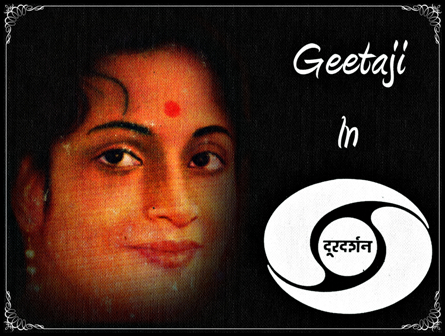
Sometime in the sixties… Eminent artiste of Tagore songs from Bengal, Sagar Sen is performing in Rabindra Sadan… A grand occasion it is, and the programme is being recorded on video tape. So how does this relate to Geetaji…?
Thus were the audience in the first row of Rabindra Sadan, gracing the occasion that day – GEETA DUTT, Kanan Devi, Protima Banerjee, Debabrata Biswas and Ashoketaru Banerjee – some greatest stalwarts of the music of the era. Sagar Sen as expected continued to sing Tagore’s melodies, one after the other, in his usual amazing manner. The programme is about to end, and the artiste is about to sing one of his finest renditions ever – “AAJ JOTSNA-RAATE SOBAI GECHHE BONE, BASANTER EI MATAL SAMEERANE”…
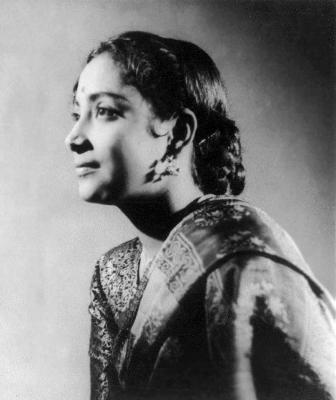
SONG – AAJ JOTSNA-RAATE SOBAI GECHHE BONE
ARTISTE – SAGAR SEN
AAJ JOTSNA-RAATE SOBAI GECHHE BONE
BASANTER EI MATAL SAMEERANE.
JAABO NAA GO JAABO NAA JE, ROINU PORE GHORER MAJHE –
EI NIRALAY ROBO AAPON KONE.
JAABO NA EI MATAL SAMEERANE.
AMAR E GHOR BOHU JATON KORE
DHUTE HOBE MUCHHTE HOBE MORE.
AMARE JE JAAGTE HOBE, KI JAANI SE AASHBE KOBE
JODI AMAY PORE TAHAR MONE
BASANTER EI MATAL SAMEERANE.
This time he calls upon his senior artistes seated in front, to come up onstage so that the programme may end with a chorus performance of the song. Who knows with how loud an applause Rabindra Sadan may have reverberated on the proposal? Kanan Devi goes up… Followed by the rest, but Geetaji is still seated. Sagar Sen speaks out, “Geetadi, aapnio aashun” (Geetadi, you too, please come). The nightingale goes up onstage. The historic programme ends with the six stalwarts singing Tagore’s “AAJ JOTSNA-RAATE SOBAI GECHHE BONE, BASANTER EI MATAL SAMEERANE”…
Kanan Devi speaks a few words, before the programme finally concludes.

No, this was not what I saw (rather, I had the fortune to see). On the night of September 22nd, 2012, Doordarshan Kolkata broadcasted a programme, the viewers of which saw this historic event happening! A teacher of mine, who had the opportunity to watch it, gave me a vivid description of the programme… Such was it!
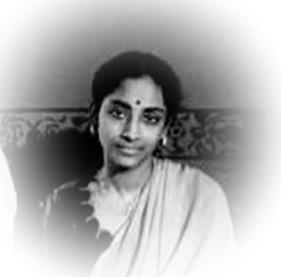
Was it a programme recorded by Doordarshan? Tushar Bhatiaji, with whom I shared the above a few weeks ago comments, it may have been recorded by someone in private earlier, reasoning that Doordarshan came to Bombay in 1972 and even later, in Calcutta – when Geetaji is no more. Tusharji says (if I may share his view that he shared with me through personal message) – “I’ll give my life to see this one!” Perhaps he spoke out the heart of the millions of admirers of Geeta Dutt and her music, all over the world!
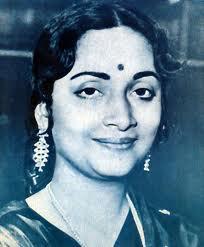
It is our misfortune that Doordarshan does not share any recordings from their archives in personal with anyone… Waiting for that holy day when the programme would be broadcasted again and someone would be recording it from television!
Acknowledgements:
We are grateful to our dear friend Sounak Gupta for writing this special article for us on this special occasion.
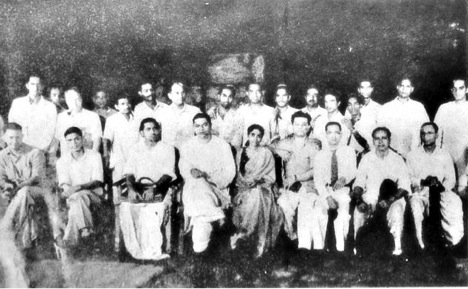
IN COMPOSER PUNKAJ MULLICK’s WORDS
TAKEN FROM page 160 of his autobiography (translated from Bengali)
…”.I was the music director in the Hindi film ‘Zalzala’ (a film by German Director Paul Zils) which was made according to Rabindranath’s ‘Char Adhyay’. Talented singer Geeta Roy (later ‘Geeta Dutt’ after marriage to actor-producer Guru Dutt) had given some playback in the film. Even today when I hear the beautiful voice of Smt. Geeta, I feel pain remembering her untimely departure. I have already said before, in order to learn the songs of ‘Zalzala’, at a point of time, she used to come to my house on regular basis. I too had gained immense pleasure in teaching her those songs «
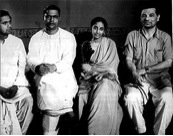
ARDENT FAN SOUNAK GUPTA SAYS….
Geetaji came from Bombay to Calcutta (in 1952 she was already one of the busiest singers in Bombay… Still she came to Calcutta)… Stayed on over here… Regularly went to Pankaj Mullick’s house… Learnt the songs like no less than a student… Successfully pleased the mentor… Recorded the songs… And finally (as she always did) pleased all of us!………. Pankaj Mullick selected Geetaji to sing in “Zalzala”… In the films where he has been MD… Only NT singers have sung… Even in Zalzala… The only other female singer was the eminent Utpala Sen… She too was from NT… Only Geetaji was a Non-NT person… Moreover… The recordings of the Zalzala songs were done in Calcutta… So Pankaj Mullick could easily have selected some vocalists from Calcutta to record those songs… BUT he chose Geetaji… Who had to come from Bombay to Calcutta to learn, reherse and record those! That PROVES, Pankaj Mullick was indeed FASCINATED by Geetaji’s renderings! So! Geetaji is a great favourite of pioneer Pankaj Mullick too… That shows… Geetaji was effortlessly effective in rendering songs of the early maestros as well!……….
Here are the five masterpieces from this film:
1) Oh Duniya waalo
2) Bujho bujho aye dilwaalo
3) Kabhi inko chaahe
4) Jaanewale de gaye
5) The best of the album ” Mujhe dekhakar woh jab muskurayenge”